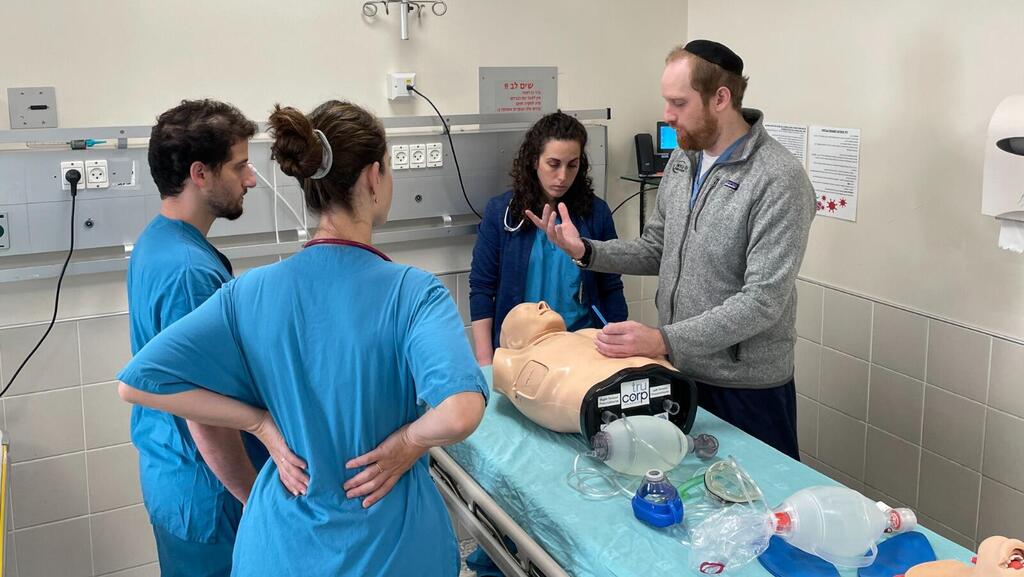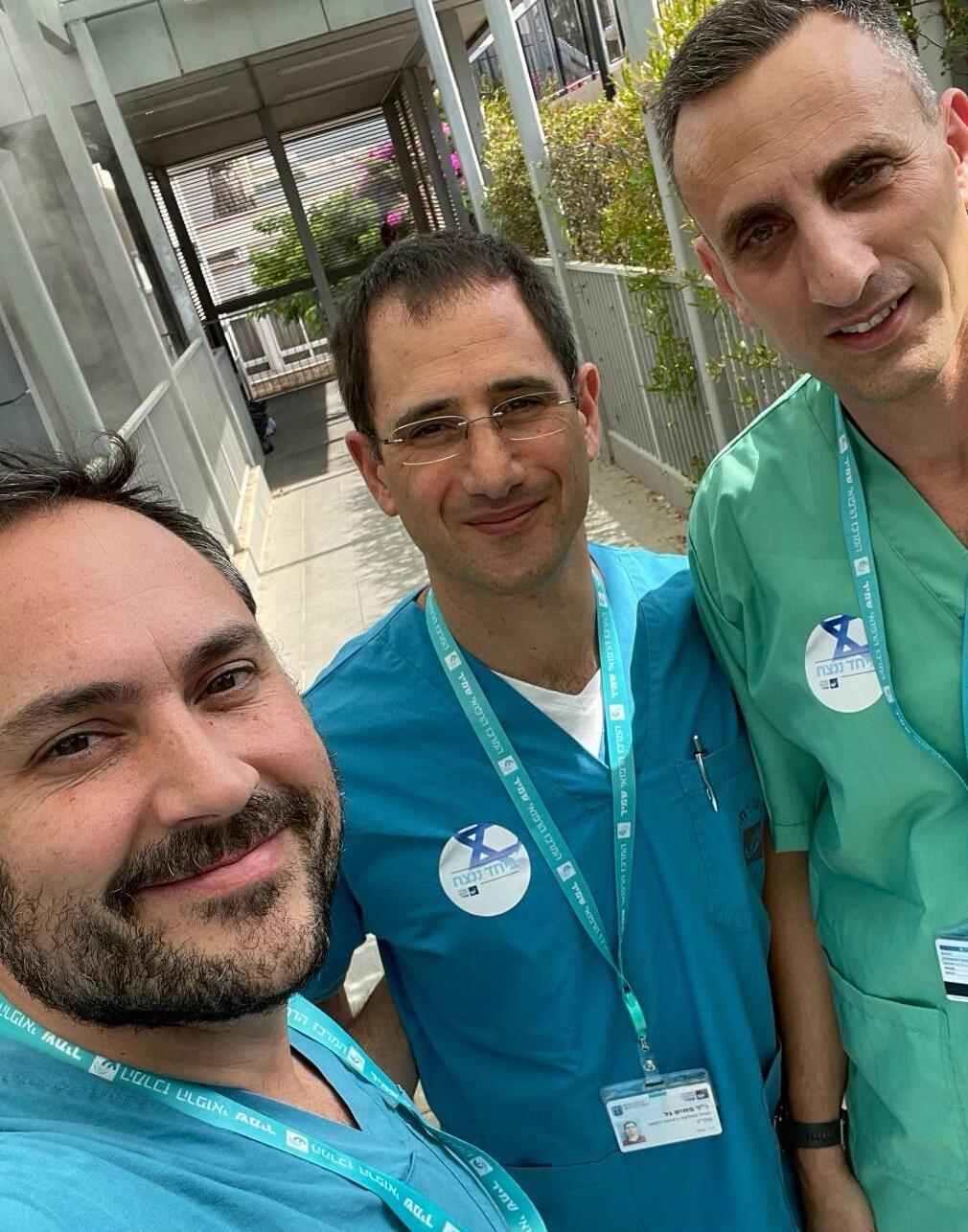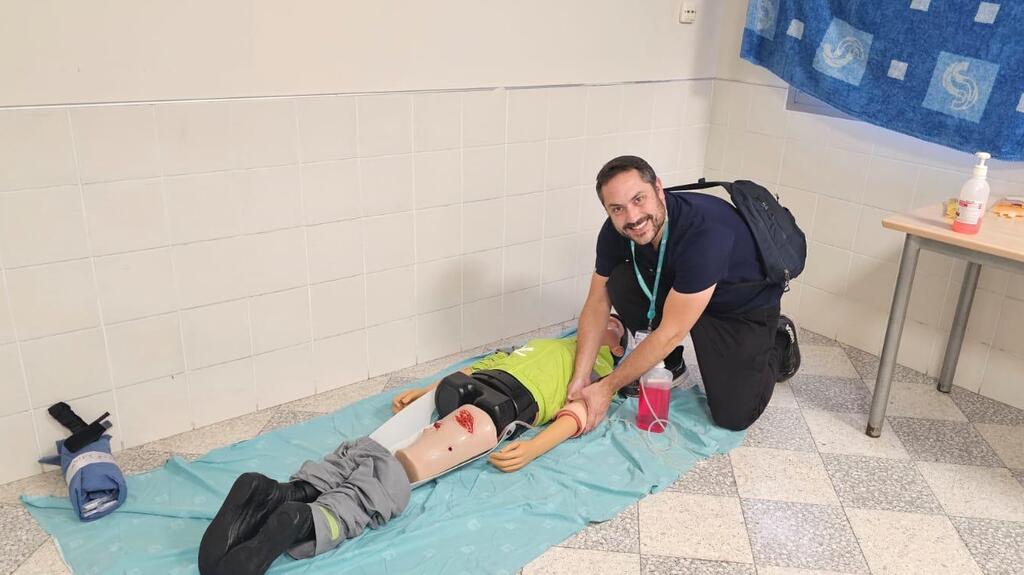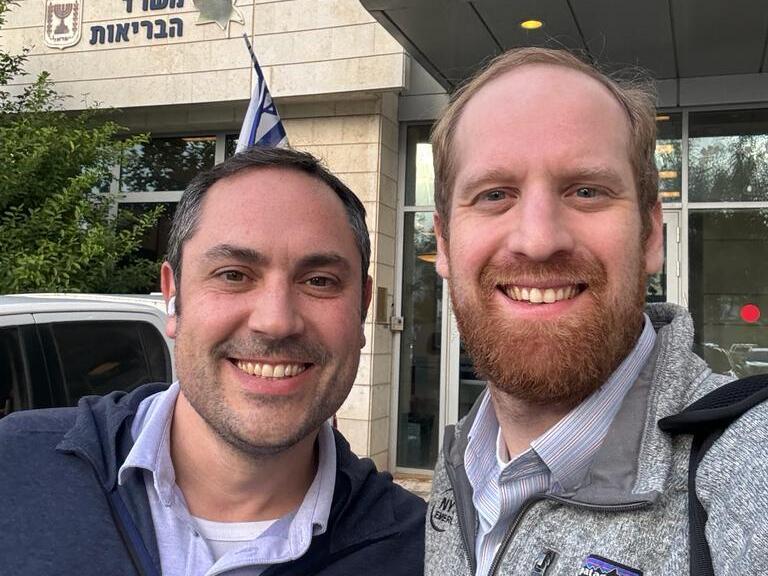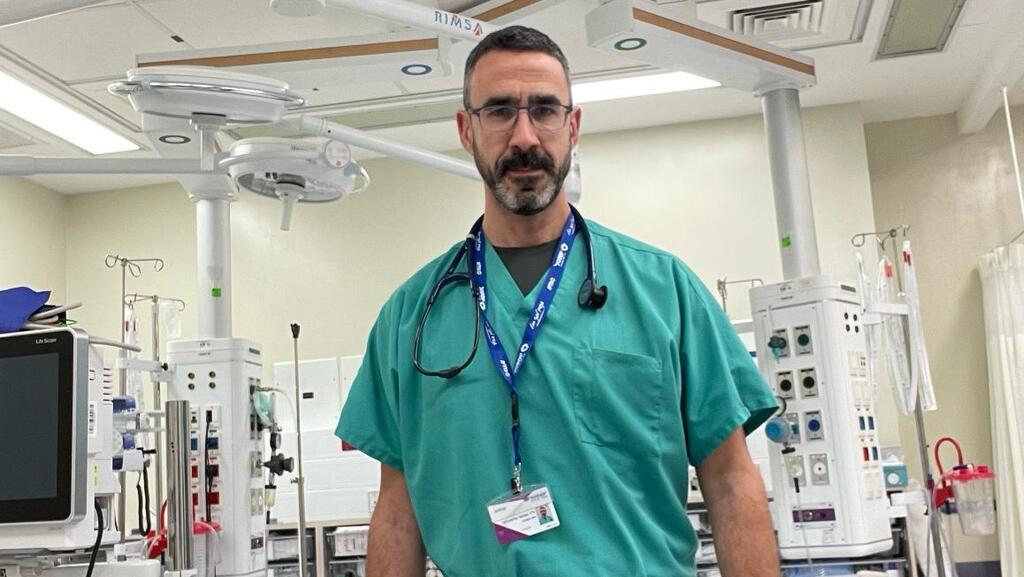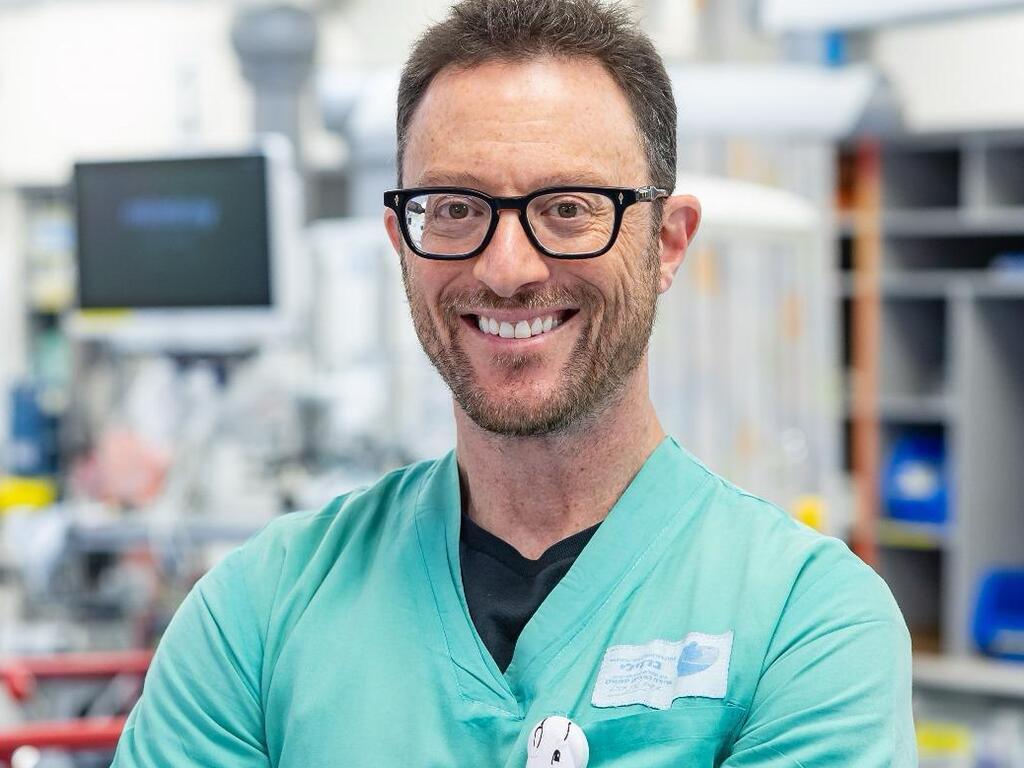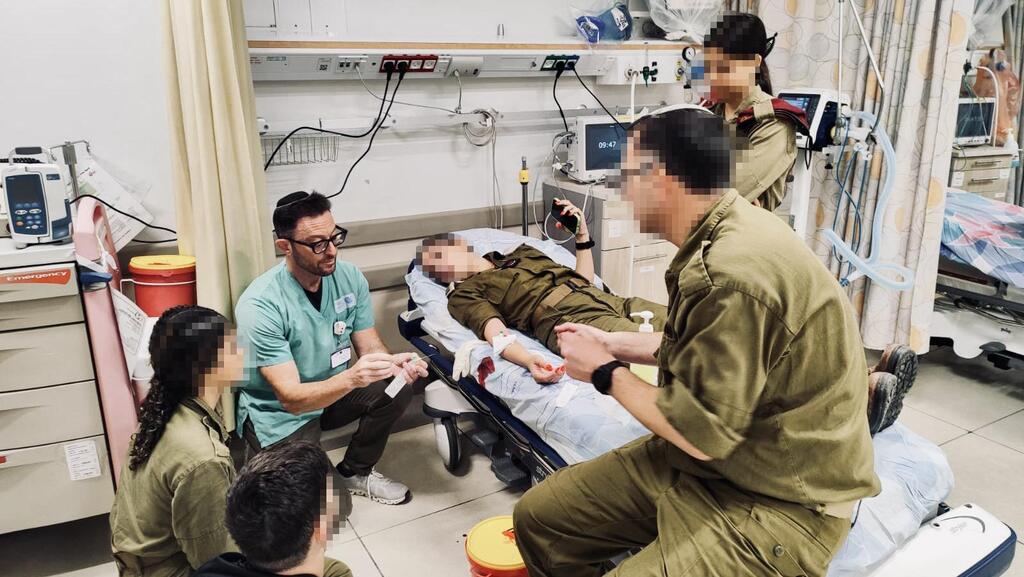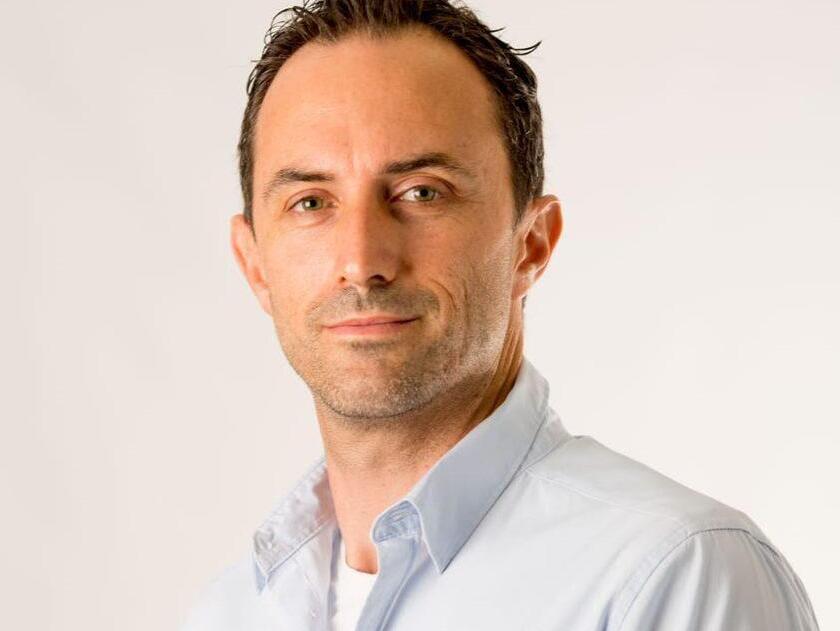Dr. Ari Greenwald from Toronto was willing to even wash the hospital floors, Dr. Joseph Offenbacher from New York left behind his physician wife and three young sons (in October and again in January), Dr. Betzalel Reich from Minnesota left Israel 20 years ago - but feels that a part of him has always remained, Dr. Benjamin Hahn from New Jersey danced “L’cha Dodi” with a recovering patient in Barzilai Medical Center. Meet the doctors who left a comfortable life behind and came to volunteer during the war in the place where their hearts reside - Israel.
- More stories:
Dozens of emergency medicine specialists from around the world have been volunteering in Israel since the outbreak of the war. In recent months, they have been working in hospitals throughout Israel - from the North down to Eilat in the South - and are devoted to contributing towards the national medical effort. They are not asking for gratitude - as far as they are concerned, the benefit is all theirs.
At the beginning of the war, the Ministry of Health received thousands of applications from doctors from around the world wanting to volunteer. The ministry subsequently developed a volunteer registry and a pathway for expedited temporary licensing. Emergency medicine volunteers represent the largest specialist group who have since come to help in Israeli hospitals.
The initiative, named “MiluEM” (EM- Emergency Medicine), was created by a team of volunteers who met during the first weeks of the war. Dr. Ari Greenwald, an emergency medicine specialist from Toronto, Canada, came almost immediately after the war broke out. Greenwald reached out to his EM friends and colleagues in Israel and initially came to volunteer and offer support at Shamir Medical Center.
After two intense weeks of work, including discussions with department chiefs and leaders throughout the country, he appreciated that there was an acute need to help alleviate the burden on the emergency medical system throughout the country. Knowing how many more volunteers there were from around the world who were also looking to help, he sought to create a program that could help on a national level.
"I felt that it was my responsibility to my children. Although they are still very young, I wanted them to understand that the future of all of us, of the entire Jewish people, is ultimately tied together here in Israel."
“MiluEM is a joint effort, but in the early days, I was certainly a driving force behind it”, he admits during a phone call from Toronto. “The initiative is built on the understanding that there are thousands of doctors like us from around the world that truly just want to help. These are people with extensive experience and a wide range of skills who can each have a significant impact."
"We all feel that we need to be in Israel to support our brothers and sisters during this difficult time. There has been a tremendous amount of volunteer interest, but practically speaking, there was no process to connect volunteers from abroad with Israeli hospitals that could use the support.
"Showing up to help on my own was a great privilege, but if we could help develop a pathway for dozens or even hundreds of other doctors to come here to help and build long term partnerships, the collective impact could be that much greater.“
Much has been said these last four months about the mental resilience of the medical teams in Israel. Dr. Greenwald agrees. “The amazing thing about Israelis is their mental toughness and fortitude. This is both a blessing and a curse. On the one hand, you’ve seen how Israeli doctors will do everything they can to get the job done - even if they have to work twice as hard with half of their staff.
Miluem project video of doctors in Israel
"They won’t complain, they won’t ask for help, and they’ll continue to work with pride and a tremendous sense of responsibility to the people they serve. But on the other hand, the price they pay over time may be burnout.”
“People in Israel have asked me, ‘Why would you leave everything and come here?’ My answer is that it’s a privilege to be here. All of us who are fortunate enough to come help feel that we are getting so much more out of being here than we are giving. We are ready and willing to be of service in any way - we can work evening and night shifts, supervise and teach residents, run simulation and training sessions, really anything that’s necessary in the emergency department.
"From my perspective, we’ll even wash floors and make coffee just so that we could be a part of the team. The beauty here is that each individual can bring a network of connections, resources, and opportunities for collaboration, and this can have a very large impact - not only now but for years to come.”
Dr. Daniel Trotzky, Deputy Director of Shamir Medical Center (Assaf Harofeh) and secretary of the Israel Association for Emergency Medicine (IAEM), shares: “We at IAEM embraced the proposal and helped Dr. Greenwald get the initiative off the ground."
"Representatives from IAEM joined forces with several prominent emergency medicine specialists in the United States and Canada, and together we presented the situation in Israel - explained where the needs were, and why the needs existed.”
“It is important to understand that at a certain point during the war, 40% of the emergency medicine workforce at Shamir Medical Center were deployed in the reserves. Another important objective was to connect with leading medical centers and institutions abroad. During the initial screening process, we received hundreds of applications which were filtered according to clinical and professional skills, as well as Hebrew language acumen.”
'Being able to work in Israel is a tremendous privilege'
Today, at this very moment, nearly 50 doctors from around the world are volunteering in hospitals throughout Israel. “We started with hospitals that suffered from a staffing shortage, as well as hospitals in the periphery or on the confrontation line”, explains Dr. Trotzky.
“From there we expanded to hospitals in the center or those without severe staffing challenges. Seeing this happen is very exciting and heartwarming. These guys came here from leading emergency medicine institutions around the world - researchers, lecturers, and clinical instructors - and the connection with them was immediate. I can share with you that on a personal level, they have even been in my home for dinner, and we continue to stay in touch even with those who have returned to their homes abroad”.
Dr. Greenwald shares that receiving his Israeli medical license was a milestone in his professional life. “The day I received my Israeli license and hospital badge was one of the proudest days of my career. To be able to work in Israel and support these amazing people that work in the healthcare system is a huge privilege. And I’m not alone. After we put out a call to recruit volunteers, hundreds of other emergency doctors around the world expressed their willingness to help as well.”
How would you summarize your experience as a doctor in Israel?
“I have quite a few stories. Typically, working in the emergency department is very intense and I don’t often spend extra time talking to my patients about things unrelated to their medical issues, but my experience in Israel has been the opposite. Each opportunity I had to speak with patients, I shared with them that I came from Canada to help.
"From my perspective, we’ll even wash floors and make coffee just so that we could be a part of the team. The beauty here is that each individual can bring a network of connections, resources, and opportunities for collaboration
"This had a big impact on the patients and their families. Knowing that there are doctors on the other side of the world showing up to help during this difficult time has had a positive impact on the residents and hospital staff as well. The human element of medicine has never been more palpable on every level.”
“Meeting with other physicians that are volunteering and seeing what they are doing is inspiring. For most of them, this is the most meaningful work that they have done in their career. Some have not been in Israel for over 20 years.
"But as soon as the war broke out, all they wanted to do was to be here to help. It’s incredible to consider how many EM specialists from around the world have now become deeply connected thanks to our common desire to help Israel.”
Dr. Joseph Offenbacher works as an emergency medicine attending physician at New York University (NYU) Medical Center, is an Associate Director of the emergency medicine residency program and is an instructor for the American College of Surgeons’ Advanced Trauma Life Support (ATLS) course.
As early as October 7, when the dire reports from Israel began pouring in, he began to look into how he could come and contribute. "I come to Israel a lot and spend a considerable amount of time there. I always wanted to be involved with Israel, even when I was younger and volunteered with Magen David Adom (MDA) as an Emergency Medical Technician (EMT)," he says.
"Although I studied in the USA and completed my residency there, I remained involved with emergency medicine in Israel. I have a group of friends that I talk to weekly and I regularly ask how I can help, especially during attacks in the previous years. They always tell me that everything is fine, but this was the first time that one of my friends asked if I could come, and that they would really appreciate the help."
He met Dr. Ari Greenwald for the first time on the evening of his arrival in Israel, on October 18th, while visiting the Shamir Medical Center. "My medical license was in Hadassah, and I practiced clinically there. When not working clinically, I organized education and simulation activities for the residents in Hadassah, Shamir and Sheba," he says.
"On the last day before I left for the United States, Ari and I met for dinner, and we talked about what can be done to establish an organized volunteering program moving forward. With the help of Drs. Trotzky and Slutzky and the support of the IAEM, we visited and connected with emergency department leadership throughout Israel. At the same time, we connected with other volunteers who came to Israel to help (Drs. Reich and Hahn), and all of us have since become close friends and a great team!”
Offenbacher, like his colleagues, feels a great sense of purpose working in Israel. "My wife is also a doctor and we have three small sons. It is very difficult to leave them, but on the other hand I felt that it was my responsibility to my children. Although they are still very young, I wanted them to understand that the future of all of us, of the entire Jewish people, is ultimately tied together here in Israel.
"It is not only my desire to be in Israel because of my Tzionut, and my love for our Country and Homeland. But, in addition, it is my fervent belief that it is a responsibility, and privilege, to serve our nation and our people in our times of need. The hope that this would ultimately be the legacy I could leave for my children was the feeling I remember being at the forefront of my mind when I got on the plane." Dr. Offenbacher returned for another two weeks in January, working clinically at Sheba Medical Center.
Is there anything in particular that you remember?
"One of the most powerful things is the people you meet and the relationships you create. Everyone suddenly becomes friends and family. It is a special relationship both personally and professionally. It was also the first time I treated Israeli soldiers. For me as a doctor, it was the most significant thing I have done in my life. It's very difficult. You feel It.”
"As a doctor I love all my patients and try to keep a perspective to help me make good clinical decisions, but when you treat soldiers who are injured while they are protecting our country, you feel an even greater sense of responsibility and meaning. Of course we all work as part of a team of doctors. The Israeli doctors are excellent and I am grateful for the teamwork and true sense of community."
The heart always stays here
Dr. Betzalel Reich works as the Regional Chair of Emergency Medicine at the Mayo Clinic Health System in Southeast Minnesota. He arrived in Israel a few days after October 7 leading a small group of volunteers. When the need for additional working hands in various emergency departments increased, he sought out additional collaboration and joined the MiluEM team.
"I've already gone twice," he says. "The first time to Ichilov right after the start of the war and the second time to Yoseftal Medical Center in Eilat. It was during the period of time when ballistic missiles were fired at Eilat. I volunteered in the emergency department and helped them prepare for multi-casualty incidents.
"It was a combination of clinical work but also educational support while working with the medical residents. Of course, there were also many evacuees in Eilat, and quite a few with medical needs. Many came to the emergency room to receive routine medical care, and others came with emergent medical needs".
He made Aliyah to Israel at the age of 10, grew up here then left for the USA to begin his medical studies. He has been there ever since, but according to him, his heart is still here. “I have been in the USA for almost 20 years, but mentally and spiritually a part of me always remained in Israel. This part of me has always wanted to help build a bridge between emergency medicine in the USA and the developing field in Israel, and to also support my childhood friends that are serving and volunteering”, he explains.
"Of course I felt that I had to do something, and that's really what pushed me to volunteer. I have a responsibility to the country, to my friends, and to my family- there was no other option. I was internally driven like many other people. Our shared vision is to continue to send volunteer emergency medicine doctors from all over the world even after the war ends”.
Among other things, during his work here, he directly experienced the sense of unity between the hospital medical teams. "While working in the emergency department you hear missile alarms. On the one hand you see the fear in people's eyes, but you also see the resilience and mental strength of the medical teams and patients.
"The emergency department is protected, there is no need to evacuate the patients, and many other teams come in as it is a safe place. Then, for 5-10 minutes there is a large gathering, and this allows you to get an idea of the community's resilience as well. Volunteers who come from outside of Israel are not used to being exposed to such a thing. It strengthens you and allows you to continue working.”
When are you planning to visit?
"My entire family is in Israel, so I am constantly back and forth. I intend to return to Israel several more times in 2024. It is very important that the leaders of the organization come to volunteer and also look at the other volunteers and Israeli medical staff in the eyes and thank them.
"Of course, none of this effort would have been possible without the assistance of our generous donors - Auschwitz Jewish center foundation and Nefesh Benefesh and with our close collaboration with ILUSDocAid.”
Dr. Binny Hahn from New Jersey works as an emergency medicine specialist at Staten Island University in New York and heads their research department. On October 7, he was in Israel to celebrate Sukkot with his family and experienced the events of that day from up close.
"I immediately called friends to see if I could help in the emergency departments, but they weren't sure what the needs were, so I returned to the USA. I couldn't really concentrate on my daily work and looked for different ways to return. In the end, the opportunity came," he says.
As part of his volunteering, Hahn worked in the emergency department at Barzilai Medical Center. "It is very difficult to describe it in words. I felt that I had a special opportunity to contribute instead of just providing emotional support.
"Along the way I felt that I myself received strength from the patients and the staff just like I was trying to provide to them. It was amazing to see how the staff works, communicates, and cares for the soldiers. To see how strong our soldiers are.”
Dr. Hahn comments on a few stories that particularly touched him during his volunteering period. "A military ambulance arrived in Barzilai and we entered the trauma room together with the soldier. There were many people in the room and one individual that no one knew.
"When it comes to treating trauma patients the Israeli teams excel, both in terms of their ability to adapt to any environment and also find new ways to take care of trauma patients."
"She said she was from the family. They asked her what the nature of her family relationship was and she answered: 'What do you mean, we are Israelis, we are all family.' Of course she didn't stay in the room, but that moment stayed with me.”
"Another story is the way the Rabbi of Barzilai Medical Center described the hospital. He called it a 'house of healing' - a place that does not focus solely on caring for the sick and injured, but on healing them physically, emotionally, and spiritually. The most moving story was of a soldier who came to the emergency department with shrapnel wounds."
"The staff treated him and cleaned out the shrapnel, and a few days later he joined us for Kabbalat Shabbat services. He was already smiling and we danced 'Lacha Dodi' around him. After that, he introduced me to another soldier who was his commander, whom he protected from the shrapnel. This was a very emotional experience."
Are there any differences between the hospitals in Israel and the U.S.?
"I would say that in most hospitals the professional level of the doctors is very good, if not better than in the USA. It is the way the patients are treated and managed that is slightly different. In Israel there are a lot of specialists who come to see the patients in the emergency department, and in the U.S. we do a lot more ourselves.
"It is not because the doctors in Israel can't do it, rather it is simply how the system works. When it comes to treating trauma patients the Israeli teams excel, both in terms of their ability to adapt to any environment and also find new ways to take care of trauma patients. They have recently come out with an app that will help them transfer medical information from the field directly to the hospital. It's amazing."
Thanking the emergency medicine doctors
Dr. Tzachi Slutzky, Chairman of the Israel Association for Emergency Medicine and Deputy Director of Soroka Hospital, wants to use the opportunity to shine a spotlight on the important activities of the emergency departments since the events of October 7.
"It is important to emphasize the role of the emergency departments during this event. We were on the frontline. The Barzilai and Soroka emergency departments received the vast majority of wounded from the incident. However, we quickly came to the realization that additional personnel were needed, especially in light of the fact that a portion of the doctors were drafted into the reserves.”
"You have to remember that we continued to treat both patients from the attack, and also routine patients. For that matter, in Soroka, where the largest emergency department in the country is located, we regularly treat an average of between 500-600 patients every day, in addition to the wounded. Beyond that, we concluded the year 2023 with a very significant increase of 10 percent more patient visits without a significant change in staffing, with the departure of many teams of doctors and nurses to the reserves."
In his words, the volunteer project helps tremendously and develops new relationships between medical teams, relationships that will continue into the future. “There is an amazing connection here, and joint education. They come here and feel that they are contributing in a very meaningful way, and we also benefit greatly from it.
"I want to say thank you to all for their incredible spirit of volunteerism, and it is also important to add thanks to the emergency department teams, who really have been working nights like days since October 7th to provide both a disaster and routine response.”
And what's next?
Dr. Daniel Trotzky says that the project already has big ambitions and plans: "The next conference of the Israel Association for Emergency Medicine will be held in the Summer and will include many new collaborations created as a result of this project. We are already seeing great byproducts of this program. We are using these connections to enrich the world of emergency medicine in Israel through these dear friends."




